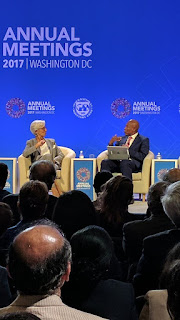IMF and World Bank Pivot Toward the Blockchain. Brendan Cody, Impact Investing Intern, George Washington University
The emergence of blockchain technology and cryptocurrency creates potential threats, but also opportunities for the world’s central banks. We noticed a pivot toward greater discussion of blockchain at the IMF and World Bank meetings we attended in early October as central bankers, financial institutions and policymakers took note of these developments.
Cryptocurrencies do not require an intermediary to verify and oversee transactions, allowing transactions to bypass the current monetary system overseen by central banks using fiat currencies.
In their official capacities as international organizations seeking coordinated and stable monetary policy, the International Monetary Fund and the World Bank recognize the potential of blockchain technology and both have taken significant steps in this fintech space.
Christine Lagarde, managing director of the IMF, suggested the creation of a digital currency based on the special drawing rights, a basket of international reserve currencies. There are details and pragmatic questions to be answered about how the currency would function, but this is certainly a positive start. Special drawing rights are seldom used, but blockchain technology could increase their utility by lowering transaction costs and decreasing settlement time. In April, The World Bank created a lab to evaluate blockchain-based currency and data storage applications.
In interviews with CNBC, both Christine Lagarde and World Bank President Jim Yong Kim were cautiously optimistic about developments in blockchain technology, acknowledging the potential but mindful of the risks embedded in this relatively unproven technology. These risks include new, unanticipated security threats and the potential for manipulation by large actors with nefarious purposes.
It will be interesting to see what the future holds for these technologies from an regulatory and institutional perspective, but blockchain's potential for disintermediation of the IMF and World Bank has put these large financial institutions on notice.
Cryptocurrencies do not require an intermediary to verify and oversee transactions, allowing transactions to bypass the current monetary system overseen by central banks using fiat currencies.
In their official capacities as international organizations seeking coordinated and stable monetary policy, the International Monetary Fund and the World Bank recognize the potential of blockchain technology and both have taken significant steps in this fintech space.
Christine Lagarde, managing director of the IMF, suggested the creation of a digital currency based on the special drawing rights, a basket of international reserve currencies. There are details and pragmatic questions to be answered about how the currency would function, but this is certainly a positive start. Special drawing rights are seldom used, but blockchain technology could increase their utility by lowering transaction costs and decreasing settlement time. In April, The World Bank created a lab to evaluate blockchain-based currency and data storage applications.
In interviews with CNBC, both Christine Lagarde and World Bank President Jim Yong Kim were cautiously optimistic about developments in blockchain technology, acknowledging the potential but mindful of the risks embedded in this relatively unproven technology. These risks include new, unanticipated security threats and the potential for manipulation by large actors with nefarious purposes.
It will be interesting to see what the future holds for these technologies from an regulatory and institutional perspective, but blockchain's potential for disintermediation of the IMF and World Bank has put these large financial institutions on notice.
